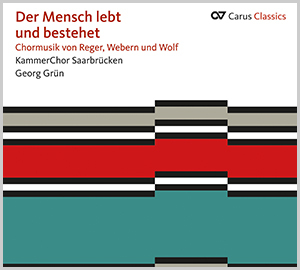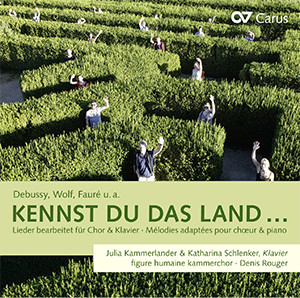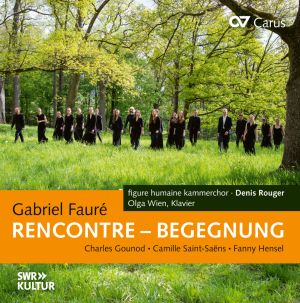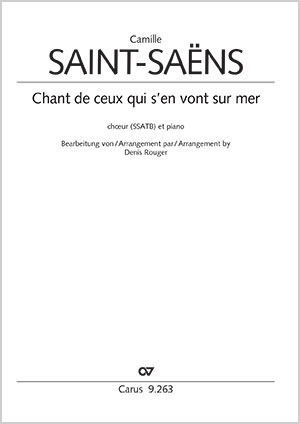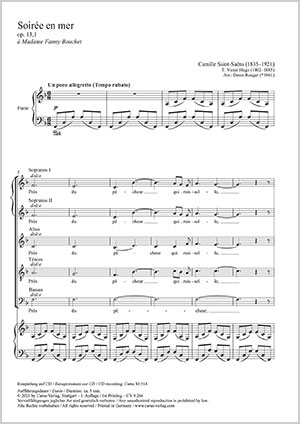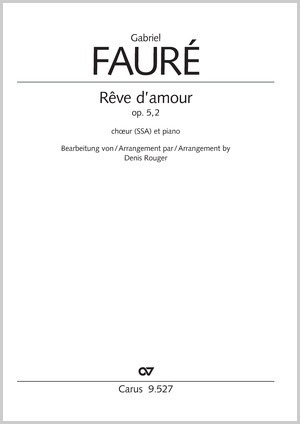...wo die Zitronen blühn (figure humaine kammerchor)
The figure humaine kammerchor under the direction of Denis Rouger devotes its new CD ... wo die Zitronen blühn once again to the wonderful German and French songs of the Romantic period. In these sensitive arrangements for choir and piano, the singers take the listeners down the most diverse paths of love in the poetry of both these countries. The well-known art songs, originally composed for solo voice and piano, are experienced in a completely new way when chorally interpreted. True gems of these two great European musical cultures have been selected for this recording, with songs by Georges Bizet, Henri Duparc, Fanny Hensel, Camille Saint-Saëns and Clara Schumann, among others. In addition, original choral works by Johannes Brahms, Hugo Wolf and Gabriel Fauré can be heard. The outstanding chamber choir is accompanied by the pianists Julia Kammerlander and Katharina Schlenker. The additional horns heard in some of the compositions complete the Romantic sound world.
Purchase
Additional product information
Contents
-
Choir
figure humaine kammerchor
figure humaine – the human face – is the inner guiding principle and name of the chamber choir of young musicians from Stuttgart which was founded in 2016. They are all united by the desire to perform choral music of a high chamber music standard. The musical focus of their work is on French and German music of the 19th to 21st centuries. A specialty of the choir and its leader and founder Denis Rouger are arrangements of French art songs, which in this way may make their way into the ears and hearts of European audiences. In addition to a reverence to the work of the poet Paul Èluard and the composer Francis Poulencs, the name of the choir also encompasses the power of each individual for the sound of the choir and for musical as well as humanistic interpretation. In addition to its Stuttgart season, the choir has been invited to several cities and festivals: the Festival for European Church Music Schwäbisch Gmünd, the festivals in Konstanz and Lorch as well as the Ludwigsburger Schlossfestspiele. In France, figure humaine has performed, among others, at the festival Les rencontres musicales in Vézelay in Bourgogne. The ensemble also collaborates with the Stuttgart Philharmonic Orchestra and with Carus-Verlag in the creation of choral anthologies with accompanying CDs. figure humaine is supported by the city of Stuttgart and the state of Baden-Württemberg. Personal details
-
Conductor
Denis Rouger
| 1961Denis Rouger grew up as the son of a family of musicians in Paris, where he learned trumpet, horn, piano and singing. He studied composition at the CNSM (Conservatoire National Supérieur de Musique), obtaining first prizes in harmony, fugue and counterpoint. He studied choral conducting in France and Holland at the Kurt Thomas Academy and received the Certificat d’Aptitude for vocal ensembles from the Ministry of Culture.
As “Professeur agrégé” at the University of Paris-Sorbonne he conducted the “Choeur de Paris-Sorbonne” and taught choral conducting for twenty years. From 1993 to 2003, he was choirmaster at Notre-Dame de Paris Cathedral and from 2005 to 2006 at the Madeleine Church, where he received the title of “Honorary Music Director.”
He has conducted numerous professional and amateur ensembles, among others in Germany – where he was invited as a guest conductor by the Landesjugendchor Baden-Württemberg and the Balthasar Neumann Chor, as well as by radio choirs in Hamburg (NDR) and Stuttgart (SWR) –, Italy, Holland, Canada, the United Arab Emirates and Switzerland (Lucerne Festival). He has also collaborated in several world premieres of contemporary works by Klaus Huber, N’guyen Thien Dao, Philippe Mazé and Yves Castagnet, among others. Denis Rouger gives master classes in choral conducting in Sweden, Bulgaria, France, Germany and Switzerland.
In April 2011, Denis Rouger was appointed Professor of Choral Conducting at the Staatliche Hochschule für Musik und Darstellende Kunst Stuttgart. The Chamber Choir of the Musikhochschule, which he founded in autumn 2011, won first prize at the International Choir Competition in Mosbach (Germany) in 2014. In collaboration with Carus the choral book French Choral Music has been published as well as the debut CD of the figure humaine kammerchor, founded in 2016 by Denis Rouger.
Personal details
-
Soloist - soprano
Hannah Gries
Hannah Gries was born in Limburg in 1996. She began her vocal training at a young age, first with the mezzo-soprano Alison Browner and later with the soprano Sabine Götz in Mannheim. In addition to numerous choral activities she has become a much sought-after concert singer. Her repertoire includes various masses and cantatas by Schubert, Mozart, Bach, Haydn or Telemann, including for example the solo cantata Jauchzet Gott in allen Landen by J. S. Bach. In addition, works such as Handel’s Messiah (also in the version by Mozart), as well as Haydn’s Creation, are now part of her repertoire. In June 2017, she made her debut as First Boy in the new production of the Magic Flute at the University of Stuttgart under the direction of UMD Veronika Stoertzenbach. In 2018, she was heard together with the pianist Andreas Frese in Mirjam’s Siegesgesang by Franz Schubert in the Weilburger Schlosskonzerte. The young soprano is also active abroad, both in choirs and as a soloist, for example in Austria, England, Israel and Korea. In 2014, Hannah Gries won the scholarship of the Kreissparkasse Limburg for young talented musicians. Since October 2015, she has been studying for a BA in singing at the Staatliche Hochschule für Musik und Darstellende Kunst Stuttgart with Ulrike Sonntag. Personal details
-
Artist
figure humaine kammerchor
figure humaine – the human face – is the inner guiding principle and name of the chamber choir of young musicians from Stuttgart which was founded in 2016. They are all united by the desire to perform choral music of a high chamber music standard. The musical focus of their work is on French and German music of the 19th to 21st centuries. A specialty of the choir and its leader and founder Denis Rouger are arrangements of French art songs, which in this way may make their way into the ears and hearts of European audiences. In addition to a reverence to the work of the poet Paul Èluard and the composer Francis Poulencs, the name of the choir also encompasses the power of each individual for the sound of the choir and for musical as well as humanistic interpretation. In addition to its Stuttgart season, the choir has been invited to several cities and festivals: the Festival for European Church Music Schwäbisch Gmünd, the festivals in Konstanz and Lorch as well as the Ludwigsburger Schlossfestspiele. In France, figure humaine has performed, among others, at the festival Les rencontres musicales in Vézelay in Bourgogne. The ensemble also collaborates with the Stuttgart Philharmonic Orchestra and with Carus-Verlag in the creation of choral anthologies with accompanying CDs. figure humaine is supported by the city of Stuttgart and the state of Baden-Württemberg. Personal details
-
Soloist - horn
Miriam Zimmermann
-
Soloist - horn
Eveline Balz
-
Soloist - horn
Tz-Shiuan You
-
Soloist - piano
Katharina Schlenker
-
Soloist - piano
Julia Kammerlander
Julia Kammerlander, born in Stuttgart, began her piano studies with Klaus Hellwig in Berlin and later continued her studies with Péter Nagy in Stuttgart, where she completed her master’s degree with top marks in 2017. After winning a scholarship at the Deutscher Musikwettbewerb in the category piano, Julia Kammerlander became a participant in the national selection of Concerts by Young Artists in the 2012/13 season; this was followed by active concert activity throughout Germany. Among the orchestras with which she has performed as a soloist are the Landesjugendorchester Baden-Württemberg and Berlin, the Südwestdeutsche Kammerorchester Pforzheim, the Stuttgarter Kammerorchester and the Stuttgarter Philharmoniker. Julia Kammerlander is a passionate and sought-after chamber musician. As a member of various duos and ensembles, she has most recently appeared at the Sommets Musicaux de Gstaad and Jeunes Talents Paris festivals, the Leipzig Bach Festival, the Gezeitenkonzerte der Ostfriesischen Landschaft, the Mecklenburg-Vorpommern Festival and the Ludwigsburg Schlossfestspiele. Recordings of her concerts have been broadcast by Deutschlandfunk, NDR, SWR and HR. Since 2016, she has been the pianist for the chamber choir figure humaine. Personal details
Frequent questions about this work
 There are no questions and answers available so far or you were unable to find an answer to your specific question about this work? Then click here and send your specific questions to our Customer Services!
There are no questions and answers available so far or you were unable to find an answer to your specific question about this work? Then click here and send your specific questions to our Customer Services!









